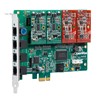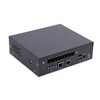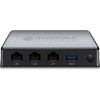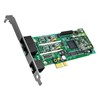Sangoma S300 - Téléphone IP 2 Comptes SIP 2 Ports Ethernet
 Chargement...
Chargement... Fiche Technique
Description du Produit
The Sangoma s300 IP Phone is so smart you can quickly and easily use them right
out of the box. Each phone in the series features industry standard Power over
Ethernet, so no power cable or outlets required. They have full duplex
speakerphones, dual Ethernet Ports, multi-way conference calling, high
definition voice quality, and they’re Virtual Private Network (VPN) capable.
Full Integration with FreePBX
FreePBX phone apps are available right on the phone, straight out of the box with no requirement for additional licenses. Users can control complicated features directly from their phones. There’s no need to remember feature codes. User applications include: Call Parking, Follow Me, Do Not Disturb, Conference Rooms, Call Forwarding, Time Conditions, Presence, Queues, Transfer to Voice Mail, Visual Voice Mail, and Log in/out.
Why is Sangoma Zero Touch Better?
VoIP telephones can be complex to install, and manually configuring many different parameters and hundreds of extensions can take hours. When you buy and install your Sangoma IP phones, the redirection server automatically points the phone to the Sangoma FreePBX for configuration. Other vendors have redirection servers, but they have to be programmed with the details of the IP PBX. Only Sangoma can provide Zero Touch provisioning with FreePBX.
EndPoint Manager Included
When using a Sangoma phone, EndPoint Manager software inside FreePBX is automatically enabled. This lets your users control global settings, program their phone keys, map extensions, upload images, download new firmware, and much more.
Full Integration with FreePBX
FreePBX phone apps are available right on the phone, straight out of the box with no requirement for additional licenses. Users can control complicated features directly from their phones. There’s no need to remember feature codes. User applications include: Call Parking, Follow Me, Do Not Disturb, Conference Rooms, Call Forwarding, Time Conditions, Presence, Queues, Transfer to Voice Mail, Visual Voice Mail, and Log in/out.
Why is Sangoma Zero Touch Better?
VoIP telephones can be complex to install, and manually configuring many different parameters and hundreds of extensions can take hours. When you buy and install your Sangoma IP phones, the redirection server automatically points the phone to the Sangoma FreePBX for configuration. Other vendors have redirection servers, but they have to be programmed with the details of the IP PBX. Only Sangoma can provide Zero Touch provisioning with FreePBX.
EndPoint Manager Included
When using a Sangoma phone, EndPoint Manager software inside FreePBX is automatically enabled. This lets your users control global settings, program their phone keys, map extensions, upload images, download new firmware, and much more.
Spécifications Techniques
Phone Features
2 SIP accounts
Call hold, mute, DND (Do Not Disturb)
One-touch speed dial, hotline
Call forward, call waiting, call transfer
Redial, call return, auto answer
3-way conferencing
Direct IP call
Ring tone selection/provisioning
Set date time automatically or manually
Dial plan per account
RTCP-XR (RFC3611),VQ-RTCPXR (RFC6035)
Action URL/URI
Voice Codecs Features
HD voice: HD handset, HD speaker
Codecs: iLBC, G.722,
G.711(A/μ), GSM_FR,
G.723, G.729AB,
G.726-32
DTMF: In-band, RFC 2833, SIP INFO
Full-duplex handsfree speakerphone with AEC (Acoustic Echo Cancellation)
IP-PBX Features
Busy Lamp Field (BLF)
Anonymous call, anonymous call rejection
Message Waiting Indicator (MWI)
Voice mail
Intercom, paging
Call park, call pickup
Music on hold
Display and Indicator
132x48 pixel graphical LCD with backlight
LED for call and message waiting indication
Illuminated LEDs for line status information
Intuitive user interface with icons and soft keys
National language selection
Caller ID with name, number
Feature Keys
2 line keys with LED
6 features keys: headset, speaker, hold, mute, transfer, conference
4 context-sensitive “soft” keys
6 navigation keys
Volume control keys
Interface
Dual-port 10/100M Ethernet
Power over Ethernet (IEEE 802.3af) (PoE), class 3
1xRJ9 (4P4C) handset port
Physical Features
Stand with 2 adjustable angles
Wall mountable
External universal
AC adapter : AC
100~240V input and
DC 5V/1.2A output
Power consumption (PSU): 1.6~2.6W
Power consumption (PoE): 2.0~3.2W
Operating humidity:
10~95%
Operating temperature: -10~50°C
Management
Configuration: browser/LCD-Menu/ auto-provision
Auto provision via
HTTP/HTTPS
FTP/TFTP
Auto-provision with PnP
Reset to factory, restart, reboot
Local tracing log export, system log
Phone lock for personal privacy protection
Network and Security
SIP v1 (RFC2543), v2 (RFC3261)
SIP server/proxy redundancy
NAT Traversal: STUN mode
DHCP/static/PPPoE
HTTP/HTTPS web server
Time and date synchronization by SNTP
DNS-NAPTR/DNSSRV (RFC 3263)
QoS: 802.1p/Q tagging (VLAN), Layer 3 ToS DSCP
IEEE802.1X
TLS (Transport
Layer Security)
SRTP
Open VPN
HTTPS certificate manager
AES encryption for configuration file
Digest authentication using MD5/MD5-sess.
Moyenne des revues

-
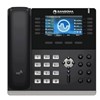
Téléphone IP 6 Comptes SIP Ecran Couleur LED 4,5" Double Port Gigabit Ethernet
229,00 € HT
229,00 € TTC -
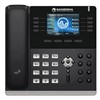
Téléphone IP 4 Comptes SIP Ecran Couleur LED 3,5" Ports Gigabit Ethernet
149,00 € HT
149,00 € TTC
Les cartes Openvox Chez Voip France
Les telephones Fanvil chez Voip France
Les cartes et passerelle Sangoma chez Voip France
Voice Time UT50 Sangoma France Sangoma Europe Sangoma UT50 Sangoma Voice Time


